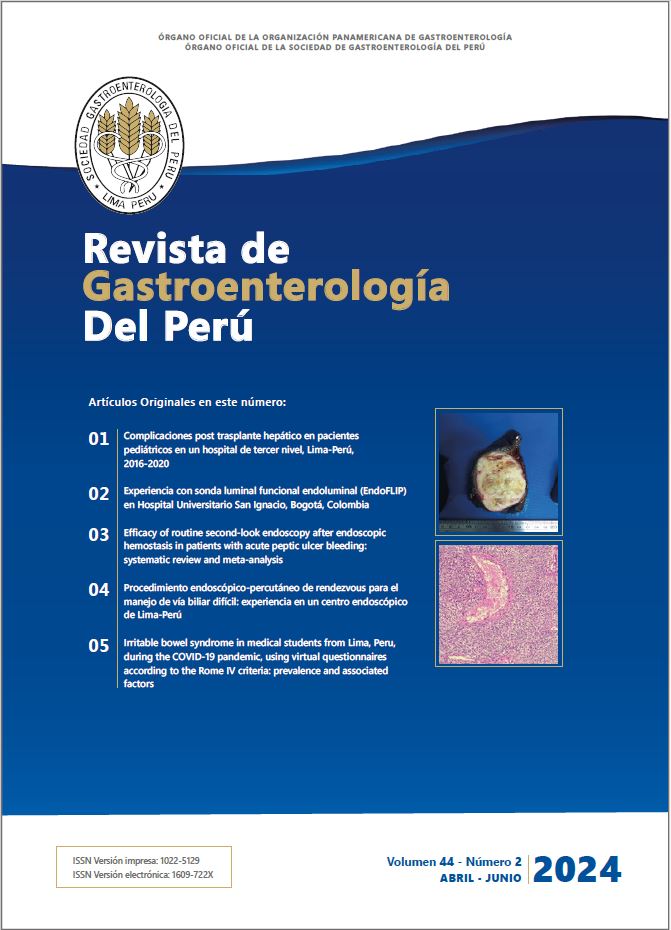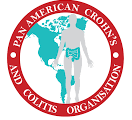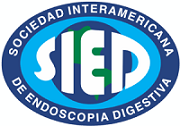Recomendaciones basadas en el manejo de pacientes con diagnóstico de enfermedad de Crohn en el contexto peruano. Documento de posición de la Asociación Peruana para el Estudio del Intestino (ASPEIN)
DOI:
https://doi.org/10.47892/rgp.2024.442.1383Palabras clave:
Enfermedad de Crohn, Guía, PerúResumen
La enfermedad de Crohn es una enfermedad inflamatoria crónica del tracto gastrointestinal cuya etiología es desconocida, que puede afectar de manera transmural cualquier segmento del intestino y/o la región perineal. A nivel mundial, la incidencia de la enfermedad inflamatoria intestinal se ha incrementado en las últimas décadas, y la misma tendencia ascendente se aprecia en Sudamérica. A nivel nacional, no existen datos oficiales, sin embargo, el incremento en el número de publicaciones en los últimos 20 años, confirma esta tendencia ascendente. La enfermedad de Crohn es una enfermedad olvidada y no cuenta con directrices clínicas implementadas basadas en evidencia que contribuyan con los clínicos en la toma de decisiones, en este sentido, la Asociación Peruana para el Estudio del Intestino considera relevante y oportuno la elaboración de este documento clínico contextualizado para el Perú.
Descargas
Métricas
Citas
Baumgart DC, Carding SR. Inflammatory bowel disease: cause and immunobiology. Lancet. 2007;369(9573):1627-1640. doi: 10.1016/S0140-6736(07)60750-8
Chang JT. Pathophysiology of Inflammatory Bowel Diseases. N Engl J Med. 2020;383(27):2652-2664. doi: 10.1056/NEJMra2002697
Torres J, Mehandru S, Colombel JF, Peyrin-Biroulet L. Crohn’s disease. Lancet. 2017;389(10080):1741-1755. doi: 10.1016/S0140-6736(16)31711-1
Selvaratnam S, Gullino S, Shim L, Lee E, Lee A, Paramsothy S, et al. Epidemiology of inflammatory bowel disease in South America: A systematic review. World J Gastroenterol. 2019;25(47):6866-6875. doi: 10.3748/wjg.v25.i47.6866
Freeman K, Ryan R, Parsons N, Taylor-Phillips S, Willis BH, Clarke A. The incidence and prevalence of inflammatory bowel disease in UK primary care: a retrospective cohort study of the IQVIA Medical Research Database. BMC Gastroenterol. 2021;21(1):139. doi:10.1186/s12876-021-01716-6.
Calderón M, Minckas N, Nuñez S, Ciapponi A. Inflammatory Bowel Disease in Latin America: A Systematic Review. Value Health Reg Issues. 2018;17:126-134. doi: 10.1016/j.vhri.2018.03.010.
Ng SC, Shi HY, Hamidi N, Underwood FE, Tang W, Benchimol EI, et al. Worldwide incidence and prevalence of inflammatory bowel disease in the 21st century: a systematic review of population-based studies [published correction appears in Lancet. Lancet. 2017;390(10114):2769-2778. doi: 10.1016/S0140-6736(17)32448-0.
Farrukh A, Mayberry JF. Inflammatory bowel disease in Hispanic communities: a concerted South American approach could identify the aetiology of Crohn’s disease and ulcerative colitis. Arq Gastroenterol. 2014;51(4):271-275. doi: 10.1590/S0004-28032014000400002.
Cedrón H, Piscoya A, de los Ríos R, Huerta-Mercado J. Prevalence of Inflammatory Bowel Disease in a National Hospital in Lima – Peru [Abstract: Inflammatory bowel disease 1127]. Am J Gastroenterol. 2006:101:pS441.
Bendaño T, Frisancho O. Perfil clínico y evolutivo de la enfermedad de Crohn en el Hospital Rebagliati (Lima-Perú). Rev Gastroenterol Perú. 2010;30(1):17-24.
Paredes Méndez JE, Alosilla Sandoval PA, Vargas Marcacuzco HT, Junes Pérez SI, Fernández Luque JL, Mestanza Rivas Plata AL, et al. Epidemiología y fenotipo de la enfermedad de Crohn en un hospital de referencia en Lima Perú. Rev Gastroenterol Perú. 2020;40(3):230-7.
Feuerstein JD, Ho EY, Shmidt E, Singh H, Falck-Ytter Y, Sultan S, et al. GA Clinical Practice Guidelines on the Medical Management of Moderate to Severe Luminal and Perianal Fistulizing Crohn’s Disease. Gastroenterology. 2021;160(7):2496-2508. doi: 10.1053/j.gastro.2021.04.022.
Singh S, Proctor D, Scott FI, Falck-Ytter Y, Feuerstein JD. AGA Technical Review on the Medical Management of Moderate to Severe Luminal and Perianal Fistulizing Crohn’s Disease. Gastroenterology. 2021;160(7):2512-2556.e9. doi: 10.1053/j.gastro.2021.04.023.
Torres J, Bonovas S, Doherty G, Kucharzik T, Gisbert JP, Raine T, et al. ECCO Guidelines on Therapeutics in Crohn’s Disease: Medical Treatment. J Crohns Colitis. 2020;14(1):4-22. doi: 10.1093/ecco-jcc/jjz180.
National Institute for Health and Care Excellence (NICE). Crohn’s disease: management [Internet]. Manchester: NICE; 2019 [citado el 3 de agosto de 2021]. Disponible en: https://www.nice.org.uk/guidance/ng129
Sambuelli AM, Negreira S, Gil A, Goncalves S, Chavero P, Tirado P, et al. Manejo de la enfermedad inflamatoria intestinal. Acta Gastroenterol Latinamer. 2019:49(Supl 2):s9.
Rezaie A, Kuenzig ME, Benchimol EI, Griffiths AM, Otley AR, Steinhart AH, et al. Budesonide for induction of remission in Crohn’s disease. Cochrane Database Syst Rev. 2015;2015(6):CD000296. doi: 10.1002/14651858.CD000296.pub4.
Malchow H, Ewe K, Brandes JW, Goebell H, Ehms H, Sommer H, Jesdinsky H. European Cooperative Crohn’s Disease Study (ECCDS): results of drug treatment. Gastroenterology. 1984 Feb;86(2):249-66.
Summers RW, Switz DM, Sessions JT Jr, Becktel JM, Best WR, Kern F Jr, et al. National Cooperative Crohn’s Disease Study: results of drug treatment. Gastroenterology. 1979;77(4 Pt 2):847-69.
Candy S, Wright J, Gerber M, Adams G, Gerig M, Goodman R. A controlled double blind study of azathioprine in the management of Crohn’s disease. Gut. 1995;37(5):674-8. doi: 10.1136/gut.37.5.674.
Ewe K, Press AG, Singe CC, Stufler M, Ueberschaer B, Hommel G, et al. Azathioprine combined with prednisolone or monotherapy with prednisolone in active Crohn’s disease. Gastroenterology. 1993;105(2):367-72. doi: 10.1016/0016-5085(93)90709-l.
Klein M, Binder HJ, Mitchell M, Aaronson R, Spiro H. Treatment of Crohn’s disease with azathioprine: a controlled evaluation. Gastroenterology. 1974;66(5):916-22.
Reinisch W, Panés J, Lémann M, Schreiber S, Feagan B, Schmidt S, et al. A multicenter, randomized, double-blind trial of everolimus versus azathioprine and placebo to maintain steroid-induced remission in patients with moderate-to-severe active Crohn’s disease. Am J Gastroenterol. 2008;103(9):2284-92. doi: 10.1111/j.1572-0241.2008.02024.x.
Stidham RW, Lee TC, Higgins PD, Deshpande AR, Sussman DA, Singal AG, et al. Systematic review with network meta-analysis: the efficacy of anti-TNF agents for the treatment of Crohn’s disease. Aliment Pharmacol Ther. 2014;39(12):1349-62. doi: 10.1111/apt.12749.
Cholapranee A, Hazlewood GS, Kaplan GG, Peyrin-Biroulet L, Ananthakrishnan AN. Systematic review with meta-analysis: comparative efficacy of biologics for induction and maintenance of mucosal healing in Crohn’s disease and ulcerative colitis controlled trials. Aliment Pharmacol Ther. 2017;45(10):1291-1302. doi: 10.1111/apt.14030.
Ford AC, Sandborn WJ, Khan KJ, Hanauer SB, Talley NJ, Moayyedi P. Efficacy of biological therapies in inflammatory bowel disease: systematic review and meta-analysis. Am J Gastroenterol. 2011;106(4):644-59, quiz 660. doi: 10.1038/ajg.2011.73.
Komaki Y, Yamada A, Komaki F, Micic D, Ido A, Sakuraba A. Systematic review with meta-analysis: the efficacy and safety of CT-P13, a biosimilar of anti-tumour necrosis factor-α agent (infliximab), in inflammatory bowel diseases. Aliment Pharmacol Ther. 2017;45(8):1043-1057. doi: 10.1111/apt.13990.
Wu G, Yang Y, Liu M, Wang Y, Guo Q. Systematic Review and Network Meta-Analysis: Comparative Efficacy and Safety of Biosimilars, Biologics and JAK1 Inhibitors for Active Crohn Disease. Front Pharmacol. 2021;12:655865. doi: 10.3389/fphar.2021.655865.
Juliao-Baños F, Grillo-A. CF, Pineda LF, Otero-Regino W, Galiano MT, García-Duperly R, et al. Guía de práctica clínica para el tratamiento de la enfermedad de Crohn en población adulta. Rev Colomb Gastroenterol. 2020;35:63-200.
Colombel JF, Sandborn WJ, Reinisch W, Mantzaris GJ, Kornbluth A, Rachmilewitz D, et al. Infliximab, azathioprine, or combination therapy for Crohn’s disease. N Engl J Med. 2010;362(15):1383-95. doi: 10.1056/NEJMoa0904492.
Matsumoto T, Motoya S, Watanabe K, Hisamatsu T, Nakase H, Yoshimura N, et al. Adalimumab Monotherapy and a Combination with Azathioprine for Crohn’s Disease: A Prospective, Randomized Trial. J Crohns Colitis. 2016;10(11):1259-1266. doi: 10.1093/ecco-jcc/jjw152.
MacDonald JK, Nguyen TM, Khanna R, Timmer A. Anti-IL-12/23p40 antibodies for induction of remission in Crohn’s disease. Cochrane Database Syst Rev. 2016;11(11):CD007572. doi: 10.1002/14651858.CD007572.pub3.
Sandborn WJ, Feagan BG, Fedorak RN, Scherl E, Fleisher MR, Katz S, et al. A randomized trial of Ustekinumab, a human interleukin-12/23 monoclonal antibody, in patients with moderate-to-severe Crohn’s disease. Gastroenterology. 2008;135(4):1130-41. doi: 10.1053/j.gastro.2008.07.014.
Feagan BG, Sandborn WJ, Gasink C, Jacobstein D, Lang Y, Friedman JR, et al. Ustekinumab as induction and maintenance therapy for Crohn’s disease. N Engl J Med 2016;375:1946-60. doi: 10.1056/NEJMoa1602773.
Rutgeerts P, Gasink C, Chan D, Lang Y, Pollack P, Colombel JF, et al. Efficacy of Ustekinumab for inducing endoscopic healing in patients with Crohn’s disease. Gastroenterology. 2018;155(4):1045-1058. doi: 10.1053/j.gastro.2018.06.035.
Sands BE, Irving PM, Hoops T, Izanec JL, Gao LL, Gasink C, et al. Ustekinumab versus adalimumab for induction and maintenance therapy in biologic-naive patients with moderately to severely active Crohn’s disease: a multicentre, randomised, double-blind, parallel-group, phase 3b trial. Lancet. 2022;399(10342):2200-2211. doi: 10.1016/S0140-6736(22)00688-2.
Sandborn WJ, Feagan BG, Rutgeerts P, Hanauer S, Colombel JF, Sands BE, et al. Vedolizumab as induction and maintenance therapy for Crohn’s disease. N Engl J Med. 2013;369(8):711-21. doi: 10.1056/NEJMoa1215739.
Feagan BG, Greenberg GR, Wild G, Fedorak RN, Paré P, Mc-Donald JW, et al. Treatment of active Crohn’s disease with MLN0002, a humanized antibody to the alpha4beta7 integrin. Clin Gastroenterol Hepatol. 2008;6(12):1370-7. doi: 10.1016/j.cgh.2008.06.007.
Sands BE, Feagan BG, Rutgeerts P, Colombel JF, Sandborn WJ, Sy R, et al. Effects of vedolizumab induction therapy for patients with Crohn’s disease in whom tumor necrosis factor antagonist treatment failed. Gastroenterology. 2014;147(3):618-627.e3. doi: 10.1053/j.gastro.2014.05.008.
Akobeng AK, Zhang D, Gordon M, MacDonald JK. Oral 5-aminosalicylic acid for maintenance of medically-induced remission in Crohn’s disease. Cochrane Database Syst Rev. 2016;9(9):CD003715. doi: 10.1002/14651858.CD003715.pub3.
Lémann M, Mary JY, Colombel JF, Duclos B, Soule JC, Lerebours E, et al. A randomized, double-blind, controlled withdrawal trial in Crohn’s disease patients in long-term remission on azathioprine. Gastroenterology. 2005;128(7):1812-8. doi: 10.1053/j.gastro.2005.03.031.
O’Donoghue DP, Dawson AM, Powell-Tuck J, Bown RL, Lennard-Jones JE. Double-blind withdrawal trial of azathioprine as maintenance treatment for Crohn’s disease. Lancet. 1978;2(8097):955-7. doi: 10.1016/s0140-6736(78)92524-2
Panés J, López-Sanromán A, Bermejo F, García-Sánchez V, Esteve M, Torres Y, et al. Early azathioprine therapy is no more effective than placebo for newly diagnosed Crohn’s disease. Gastroenterology. 2013;145(4):766-74.e1. doi: 10.1053/j.gastro.2013.06.009.
Cosnes J, Bourrier A, Laharie D, Nahon S, Bouhnik Y, Carbonnel F, et al. Early administration of azathioprine vs conventional management of Crohn’s Disease: a randomized controlled trial. Gastroenterology. 2013;145(4):758-65.e2; quiz e14-5. doi: 10.1053/j.gastro.2013.04.048.
Feagan BG, Rochon J, Fedorak RN, Irvine EJ, Wild G, Sutherland L, et al. Methotrexate for the treatment of Crohn’s disease. The North American Crohn’s Study Group Investigators. N Engl J Med. 1995;332(5):292-7. doi: 10.1056/NEJM199502023320503.
Coward S, Kuenzig ME, Hazlewood G, Clement F, McBrien K, Holmes R, et al. Comparative Effectiveness of Mesalamine, Sulfasalazine, Corticosteroids, and Budesonide for the Induction of Remission in Crohn’s Disease: A Bayesian Network Metaanalysis. Inflamm Bowel Dis. 2017;23(3):461-472. doi: 10.1097/MIB.0000000000001023. Erratum in: Inflamm Bowel Dis. 2017 May 1;23(5):E25. Corrected and republished in: Inflamm Bowel Dis. 2017;23(5):E26-E37.
Chalhoub JM, Rimmani HH, Gumaste VV, Sharara AI. Systematic Review and Meta-analysis: Adalimumab Monotherapy Versus Combination Therapy with Immunomodulators for Induction and Maintenance of Remission and Response in Patients with Crohn’s Disease. Inflamm Bowel Dis. 2017;23(8):1316-1327. doi: 10.1097/MIB.0000000000001203.
Kamm MA, Hanauer SB, Rutgeerts P, Colombel JF, Sandborn WJ, Lomax KG ,et al. Results from an open label extension of CHARM: Steroid-free remission in patients with Crohn’s disease who received Adalimumab therapy for at least 3 years. Gastroenterology 2009;136:A653. doi: https://doi.org/10.1016/S0016-5085(09)63010-9.
Moja L, Danese S, Fiorino G, Del Giovane C, Bonovas S. Systematic review with network meta-analysis: comparative efficacy and safety of budesonide and mesalazine (mesalamine) for Crohn’s disease. Aliment Pharmacol Ther. 2015;41(11):1055-65. doi: 10.1111/apt.13190.
Bermejo F, Guerra I, Algaba A, López-Sanromán A. Pharmacological Approach to the Management of Crohn’s Disease Patients with Perianal Disease. Drugs. 2018;78(1):1-18. doi: 10.1007/s40265-017-0842-x.
Colombel JF, Schwartz DA, Sandborn WJ, Kamm MA, D’Haens G, Rutgeerts P, et al. Adalimumab for the treatment of fistulas in patients with Crohn’s disease. Gut. 2009;58(7):940-8. doi: 10.1136/gut.2008.159251.
Thia KT, Mahadevan U, Feagan BG, Wong C, Cockeram A, Bitton A, et al. Ciprofloxacin or metronidazole for the treatment of perianal fistulas in patients with Crohn’s disease: a randomized, double-blind, placebo-controlled pilot study. Inflamm Bowel Dis. 2009;15(1):17-24. doi: 10.1002/ibd.20608.
Chande N, Patton PH, Tsoulis DJ, Thomas BS, MacDonald JK. Azathioprine or 6-mercaptopurine for maintenance of remission in Crohn’s disease. Cochrane Database Syst Rev. 2015;2015(10):CD000067. doi: 10.1002/14651858.CD000067.pub3.
Descargas
Publicado
Cómo citar
Número
Sección
Licencia
Derechos de autor 2024 Juan Eloy Paredes-Méndez, Hugo Guillermo Cedrón-Cheng, Luis Alberto Cervera-Caballero, Rossana Andrea Franco-Vásquez, Jorge Vásquez-Quiroga, Pedro Alberto Larrea-Lúcar, Ana Lucía Mestanza-Rivasplata, César García-Delgado, Julissa Mirella Guevara-Miranda, Raúl Alonso Timaná Ruiz

Esta obra está bajo una licencia internacional Creative Commons Atribución 4.0.
Revista de Gastroenterología del Perú by Sociedad Peruana de Gastroenterología del Perú is licensed under a Licencia Creative Commons Atribución 4.0 Internacional..
Aquellos autores/as que tengan publicaciones con esta revista, aceptan los términos siguientes:
- Los autores/as conservarán sus derechos de autor y garantizarán a la revista el derecho de primera publicación de su obra, el cuál estará simultáneamente sujeto a la Licencia de reconocimiento de Creative Commons que permite a terceros compartir la obra siempre que se indique su autor y su primera publicación esta revista.
- Los autores/as podrán adoptar otros acuerdos de licencia no exclusiva de distribución de la versión de la obra publicada (p. ej.: depositarla en un archivo telemático institucional o publicarla en un volumen monográfico) siempre que se indique la publicación inicial en esta revista.
- Se permite y recomienda a los autores/as difundir su obra a través de Internet (p. ej.: en archivos telemáticos institucionales o en su página web) antes y durante el proceso de envío, lo cual puede producir intercambios interesantes y aumentar las citas de la obra publicada. (Véase El efecto del acceso abierto).




















 2022
2022 